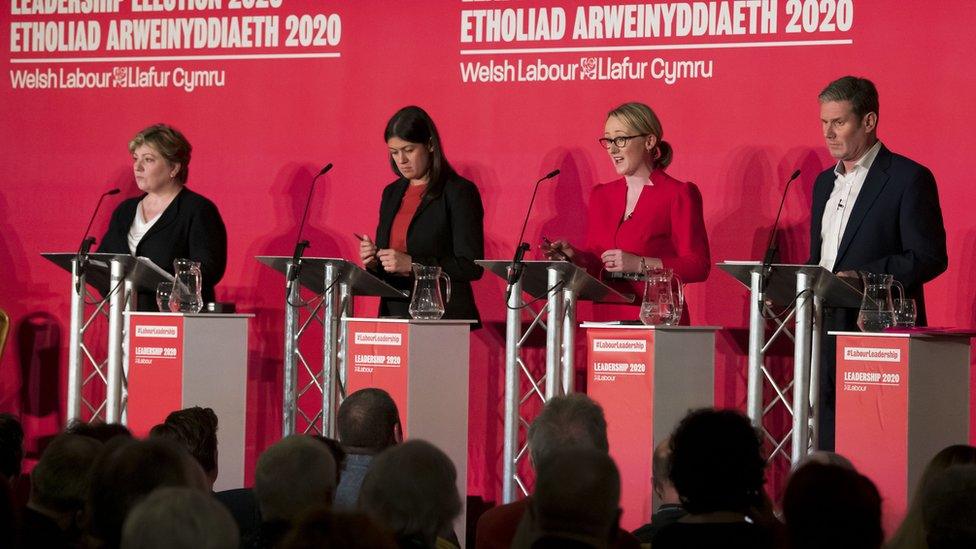Can Emily Thornberry break into the Labour leadership race?
- Published
In full: Emily Thornberry interview with Laura Kuenssberg
Emily Thornberry is the most experienced politician in the race to become Labour's next leader.
Why then is she lagging so far behind the others in the contest?
And why does it look tricky for her to get into the final round when she is one of the party's great survivors?
Her explanation is that she is stuck in a "good old fashioned squeeze".
She told me some Labour voters are telling her they would love to vote for her, but, if they are on the left of the party, they "want to stop Keir Starmer".
On the other side, members are confiding in her that they would like to back her, but they "want to stop Rebecca Long-Bailey" if they are on Labour's right.
There is someone else in the race too, of course - Lisa Nandy, who is managing to get more cut through.
It is easier for her to be more spiky though, as she was not part of the leadership team that just crashed to a terrible defeat in the election (unlike Thornberry, Starmer and Long-Bailey).
And it is possible for her to issue warnings, such as "change or die", to the party, without doing the kind of political gymnastics frontbenchers have to do.
'Two inevitabilities'
But Thornberry's position is a also reflection of the fact that, from the very start of the contest, it was likely the powerful campaigning machine of the Unite union and the Momentum campaign group - both who backed Jeremy Corbyn - would swing behind Long-Bailey, the chosen successor of the project.
And it was also obvious that a significant chunk of the parliamentary party would gather behind Sir Keir - who was publicly loyal to Jeremy Corbyn, but MPs like to believe, between the lines, is much closer to the centre of opinion in the party.
Although he is stepping through this contest gingerly, it is very hard to tell if that is true for now.
It is true, therefore, that Thornberry's candidacy does fall between the two inevitabilities.

Emily Thornberry, Lisa Nandy, Rebecca Long-Bailey and Sir Keir Starmer have been taking part in hustings around the UK
The race was cast as one of two contenders at the start and it's taken on that dynamic.
But perhaps Thornberry is also not yet cutting through because, in common with the others, she is achingly careful about what she is saying.
She'll suggest that Labour wasn't professional, that there were bad tactical errors, that Jeremy Corbyn shouldn't now be sending his friends to the House of Lords.
But she'll stop short of admitting that anything in the manifesto was a mistake, saying instead there was just too much on offer.
She'll say that Labour should never have agreed to an election, and that she argued against it, that the party's Brexit position was not clear enough, and that the party was too slow to deal with anti-Semitism.
But she told me the party doesn't need to sink into an "existential crisis". If not going down to the worst defeat in decades after 10 years of Tory rule, what would a crisis really be?
'What crisis?'
Of course the decision of who is going to be Labour's next leader is being made by the party's members.
It is unlikely that a candidate would storm to success by decrying everything that has just gone before.
But there's a whiff of "crisis, what crisis?" about much of this leadership race.
Just as when we talked to Sir Keir and Long-Bailey, it seems easier at this stage for them all to tacitly agree that some things went wrong, the party's message was badly handled, and Brexit and anti-Semitism were tricky on the doorstep.
But it's hard to see how the party can hope to be effective and relevant again soon if the potential leaders aren't to be braver in their verdict on the electoral disaster that's just happened and, more importantly, be putting forward more striking visions of what could come next.
A few days ago Dave Ward, the leader of one of the mighty unions, called for a more "dynamic" race.
If none of the candidates are yet catching the imagination of the party's powerful backers, can any of them hope to be able ultimately to catch the public's eye?
You can watch our interviews with the candidates so far below:
